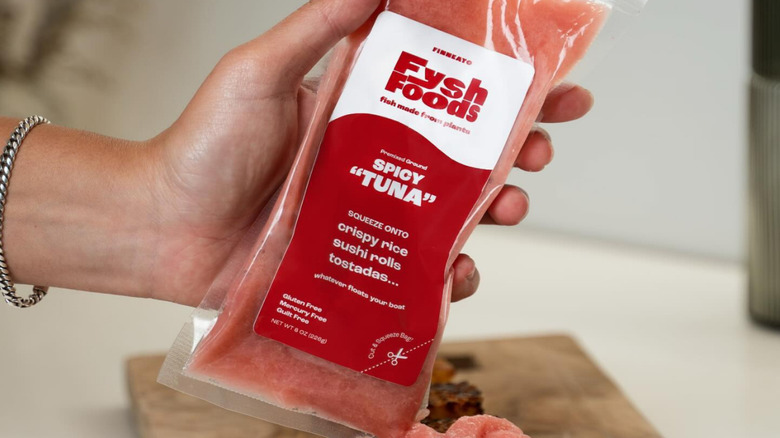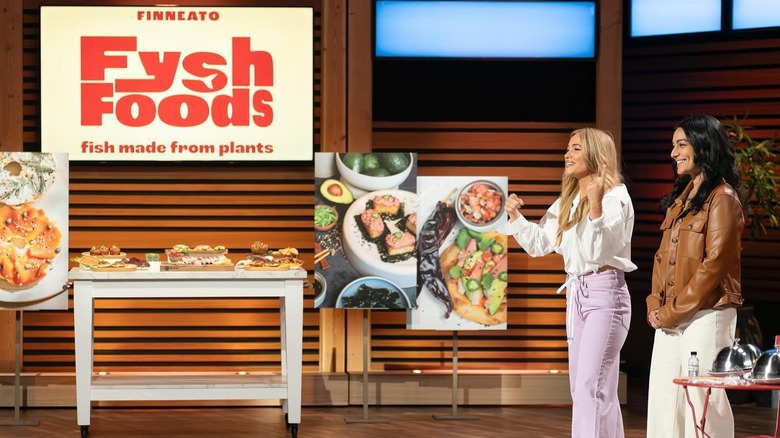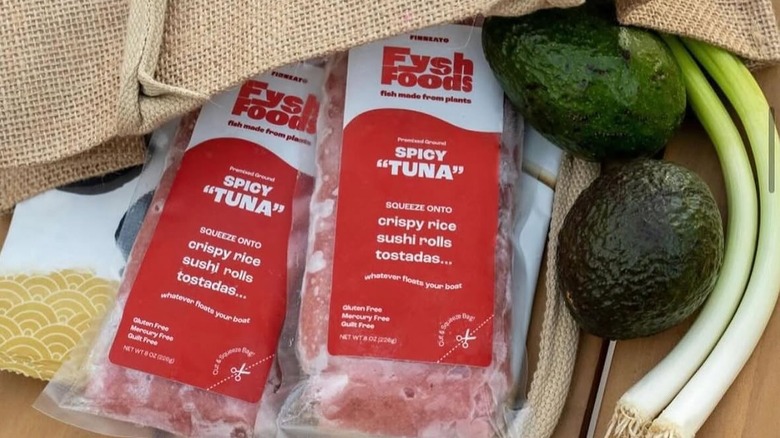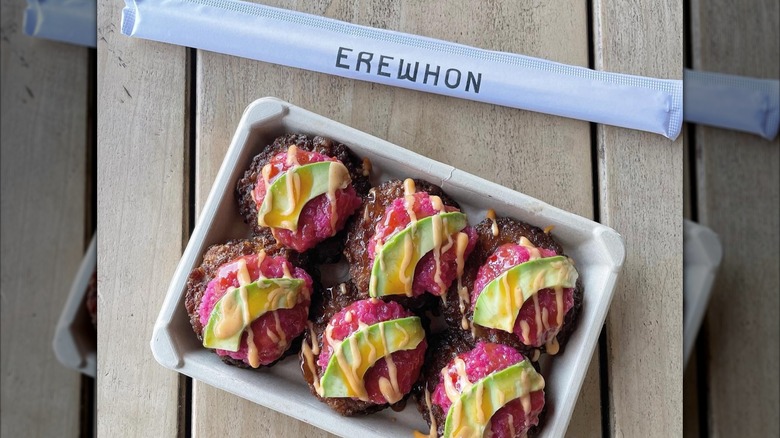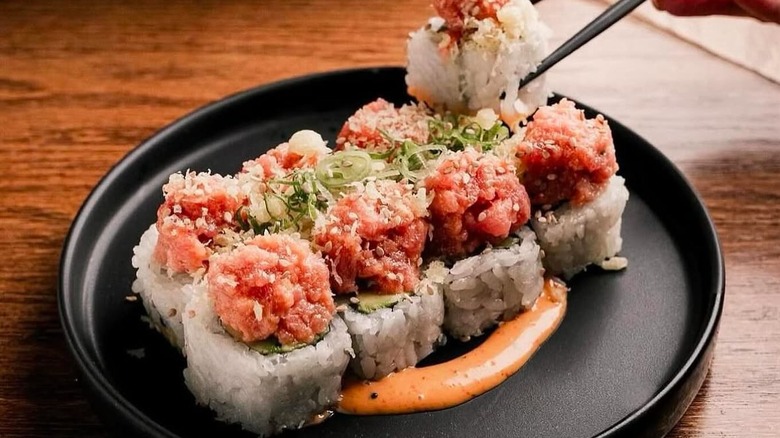What Happened To Finnaeato Fysh Foods After Shark Tank?
Raw fish is delicious, whether served in sushi, poke bowls, or smoked on a bagel — but buying and handling raw seafood can be tricky: Raw fish can bring the risk of salmonella or parasites – tapeworms, for example, are more prevalent in freshwater fish — and even microplastics. While some fish have lower mercury levels, that's also a risk, especially if you're someone who habitually gets a poke bowl or sushi roll.
That's why, after developing an allergy to raw fish, Zoya Biglary founded Finneato Fysh Foods, an eco-friendly substitute created in Los Angeles. Fysh Foods was developed to open up the world of raw fish consumption to non-fish eaters or just to those looking to be more sustainable, as it's entirely plant-based without chemical additives. The company incorporates root vegetables, tapioca, and sea algae to create a convincing substitute for familiar favorites like spicy tuna.
She spent a year working with chef Paul Barbosa, Jr., to perfect the recipe while self-funding her company by creating viral cooking videos alongside business partner, fiancée, and cooking media specialist Alix Traeger. Their success cultivating an online following led to Biglary and Traeger being approached by "Shark Tank" producers, an opportunity they seized despite worries that the company was still in its nascent stages.
What happened to Finneato Fysh Foods on Shark Tank?
The Finneato representatives started their stint on season 16, episode four of "Shark Tank" by highlighting the product's benefits. They also emphasized that because of the effort in creating a food that handles similarly to the original, it can be easily adapted for chefs who customarily work with raw fish — while being cheaper, more sustainable, and having a longer shelf life. Zoya Biglary and Alix Traeger presented samples of the company's spicy tuna crispy rice, smoked lox, and ceviche. Robert Herjavec and Daniel Lubetzky were particularly struck by the product being nearly indistinguishable from actual raw fish.
However, the Sharks were surprised that Finneato was only operating on a business-to-business model, selling frozen fillets to restaurants and companies. Biglary confessed that this constraint was due to insufficient funding, which was highlighted by the previous year's $50,000 in sales, a mark that dismayed and ultimately dissuaded Herjavec. She explained that Fysh Foods costs $4 per pound to produce, which is sold for between $10-15 wholesale, as opposed to the $20-40 per pound sashimi-grade, which is different from sushi-grade, fish generally costs.
Kevin O'Leary was turned off by the B2B sales model, as well as the pair's inability to use their combined three million social media followers to create a customer base, so he was out, as was Lori Greiner. Mark Cuban was less discouraged by the model, but thought that it would be too difficult to scale up, so he, too, was out. Lubetzky was the most passionate about the product and thought that there was a real market for it, so he countered the $150,000 for a 10% stake that they were seeking with a 40% stake. After a lengthy negotiation, they settled at $150,000 for 30%.
Finneato Fysh Foods after Shark Tank
Following Daniel Lubetzky's involvement with the product, Zoya Biglary revealed that Lubetzky had always been the Shark she was hoping to attract, given that he, like her, is an immigrant and founder of a health-conscious food product. Finneato Fysh Foods has since experienced a swell of interest, with an emphasis not only on expanding in the wholesale market but also adding a direct-to-consumer shopping option for the customers whose interest was piqued by their appearance on the show.
Despite displaying three different dishes to the "Shark Tank" judges, the customer retail offerings are still somewhat limited. However, the company has expanded to ship one of its products nationally as of 2024, using the independent, woman-owned online retailer Besties Vegan Paradise to ship the spicy tuna pack across the country. That's helpful, considering the two-pack of spicy tuna, which makes 72 pieces of sushi and sells for $34.99, is sold out on Finneato's website, as of May 2025.
Is Finneato Fysh Foods still in business?
Finneato Fysh Foods is very much in business. The company's popular spicy tuna crispy rice can now be found at the upscale Southern California supermarket chain Erewhon, specifically at locations in Silver Lake, the Grove, and West Hollywood. Shoppers can find the pre-made vegan meals at the sushi bars next to full-fish options in an extensive prepared food section.
Fysh Foods is also featured in seven LA-based restaurants. That includes Ma-Kin Vegan Sushi in Agoura Hills, Koi, a restaurant known for attracting and retaining famous entertainment industry clientele, and Santō Silverlake, a Japanese-Mexican fusion sushi restaurant with a flagship location based in Mexico City. Kombu Sushi offers Fysh Food at both their Silverlake and downtown locations, with tuna, yellowtail, and salmon appearing on the restaurant's menus. Finneato has also partnered with Calamigos Ranch for catered events and weddings.
What's next for Finneato Fysh Foods?
In March, 2025, Zoya Biglary was named one of Inc.'s top female founders and entrepreneurs, which was followed by her speaking at a panel co-hosted by The Female Quotient called The Future of Creator-Led Brands at Austin, Texas's iconic South By Southwest festival.
In January, the company was nominated for the 2025 VegNews Veggie Awards for best vegan seafood of 2025, though it ultimately didn't win. In an interview with Business Insider, Biglary said that she and the other founders still mix all the ingredients together by hand in a commercial kitchen, rather than relying on machines. The main reason? To keep the environmental impact down (per Business Insider).
She's currently looking into finding a more sustainable alternative for her packaging needs than vacuum-sealed plastic, as the eco-footprint and waste-reduction that Fysh Foods offers is one of the most important parts of the business, as is the potential diminishing of harmful overfishing practices. The company's website is up and running, but it seems to be a bit of a work in progress, offering the promise of future merchandise for sale.

